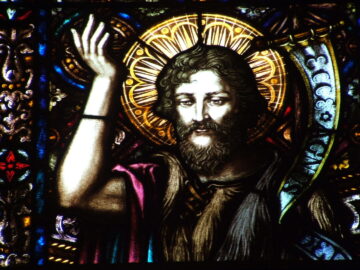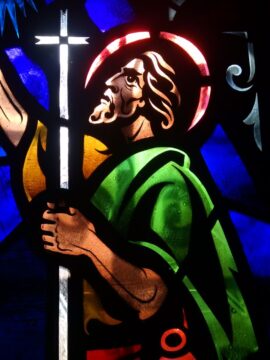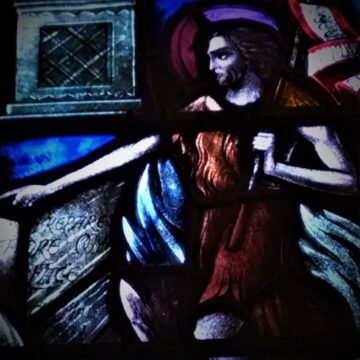While contemplating the readings for Advent, Franciscan Sisters of Christian Charity are captivated by the figure of St. John the Baptist. We invite you to join us in looking to the fine arts to better immerse ourselves in the person who foreshadowed the Christ. We share some truly stunning stained-glass windows depicting this formidable figure in Salvation History and a poem from Thomas Merton.
First, is an image from St. Mary Basilica, St. Paul, Minnesota. This window was one of many designed, executed and installed by Thomas J. Gaytee Studios of Minneapolis. Thomas Gaytee worked under Louis Comfort Tiffany in New York. He originally came to Minneapolis as a salesperson for Tiffany. By 1918 he worked for the Minneapolis based Ford-McNutt Glass Company. When the company was discontinued, Gaytee bought their stained-glass materials and started his own company. In 1924 he completed a first set of windows for The Basilica, including the windows in the dome. In 1925 he began work on all the other windows which he completed by 1926.
Next, two amazing stained-glass windows from the Archdiocese of Milwaukee. First, enjoy an artistic creation from the Discalced Carmelite Parish of St. Florian Parish, Milwaukee, Wisconsin. The brilliancy of the stained glass is difficult to fully capture. The parish’s mission is ‘together we serve’-since 1911!
Second, pray with a depiction from St. Robert, Shorewood, Wisconsin. This is a Catholic Community that strives – “in the words of St. Francis of Assisi – to be a channel of God’s peace for others and a light on a lampstand for all to see the beauty of God and his creation as Jesus challenged”. The stained-glass art portray sJohn the Baptist as a determined prophet amid darker shades of color.
Both stained glass windows highlight verses from one of Thomas Merton’s poems. Merton’s monastic poetry was written during his first monastic Advent. He frequently meditated on John the Baptist from “The Quickening of John the Baptist” to this longer piece simply entitled “John the Baptist” shared from https://thevalueofsparrows.wordpress.com/2012/06/29/poetry-st-john-baptist-by-thomas-merton/.
May St. John the Baptist lead us to Jesus.
St. John the Baptist by Thomas Merton
I
When, for the fifteenth year, Tiberius Caesar
Cursed, with his reign, the Roman world,
Sharing the Near-East with a tribe of tetrarchs,
The Word of God was made in far-off province:
Deliverance from the herd of armored cattle,
When, from the desert, John came down to Jordan.
But his prophetic messages
Were worded in a code the scribes were not prepared to understand.
Where, in their lexicons, was written: “Brood of vipers,”
Applied, that is, to them?
“Who is this Lamb, Whose love
Shall fall upon His people like an army:
Who is this Savior, Whose sandal-latchet
This furious Precursor is afraid to loose?”
His words of mercy and of patience shall be flails
Appointed for the separation of the wheat and chaff.
But who shall fear the violence
And crisis of His threshing-floor
Except the envious and selfish heart?
Choose to be chaff, and fear the Winnower,
For then you never will abide His Baptism of Fire and Spirit.
You proud and strong,
You confident in judgment and in understanding,
You who have weighed and measured every sin
And have so clearly analyzed the prophecies
As to be blinded on the day of their fulfillment:
Your might shall crumble and fall down before Him like a wall,
And all the needy and the poor shall enter in,
Pass through your ruins, and possess your kingdom.
This is the day that you shall hear and hate
The voice of His beloved servant.
This is the day your scrutiny shall fear
A terrible and peaceful angel, dressed in skins,
Knowing it is your greedy eyes, not his, that die of hunger.
For God has known and loved him, from his mother’s womb,
Remembering his name, filling his life with grace,
Teaching him prophecy and wisdom,
To burn before the Face of Christ,
Name Him and vanish, like a proclamation.
II
Tell us, Prophet, Whom you met upon the far frontier
At the defended bridge, the guarded outpost.
“I passed the guards and sentries,
Their lances did not stay me, or the gates of spikes
Or the abysses of the empty night.
I walked on darkness
To the place of the appointed meeting:
I took my sealed instructions,
But did not wait
For compliment or for congratulation from my hidden Captain.
Even at my return
I passed unseen beside the stern defenders
In their nests of guns,
And while the spies were trying to decode some secret
In my plain, true name.
I left them like the night wind.”
What did you learn on the wild mountain
When hell came dancing on the noon-day rocks?
“I learned my hands could hold
Rivers of water
And spend them like an everlasting treasure.
I learned to see the waking desert
Smiling to behold me with the springs her ransom,
Open her clear eyes in a miracle of transformation,
And the dry wilderness
Suddenly dressed in meadows,
All garlanded with an embroidery of flowering orchards
Sang with a virgin’s voice,
Descending to her wedding in these waters
With the Prince of Life.
All barrenness and death lie drowned
Here in the fountains He has sanctified,
And the deep harps of Jordan
Play to the contrite world as sweet as heaven.”
But did your eyes buy wrath and imprecation
In the red cinemas of the mirage?
“My eyes did not consult the heat of the horizon:
I did not imitate the spurious intrepidity
Of that mad light full of revenge.
God did not hide me in the desert to instruct my soul
In the fascism of as asp or scorpion.
The sun that burned me to an Arab taught me nothing:
My mind is not in my skin.
I went into the desert to receive
The keys of my deliverance
From image and from concept and from desire.
I learned not wrath but love,
Waiting in darkness for the secret stranger
Who, like an inward fire,
Would try me in the crucibles of His unconquerable Law:
His heat, more searching than the breath of the Simoon,
Separates love from hunger
And peace from satiation,
Burning, destroying all the matrices of anger and revenge.
It is because my love, as strong as steel, is armed against all hate
That those who hate their own lives fear me like a sabre.”
III
St. John, strong Baptist,
Angel before the face of the Messiah
Desert-dweller, knowing the solitudes that lie
Beyond anxiety and doubt,
Eagle whose flight is higher than our atmosphere
Of hesitation and surmise,
You are the first Cistercian and the greatest Trappist:
Never abandon us, your few but faithful children,
For we remember your amazing life,
Where you laid down for us the form and pattern of
Our love for Christ,
Being so close to Him you were His twin.
Oh buy us, by your intercession, in your mighty heaven,
Not your great name, St. John, or ministry,
But oh, your solitude and death:
And most of all, gain us your great command of graces,
Making our poor hands also fountains full of life and wonder
Spending, in endless rivers, to the universe,
Christ, in secret, and His Father, and His sanctifying Spirit.


